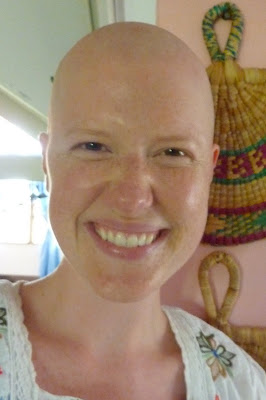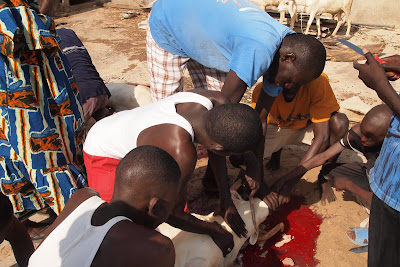So many things to share....
Where to begin? I have adopted a pleasant rhythm of sleeping and waking, observing Senegalese family life, reading my Bible and learning Wolof. Each day presents the opportunity to seize a new venture, whether that be cooking Senegalese food, meeting with the mayor of one of Dakar’s communes, spending the morning at the largest fish market in West Africa and helping to sell porridge to hungry fishmongers, or learning the art of making and pouring Senegalese tea. After a little more than two weeks, I have assimilated into life at Lôen (meaning the place where the Lô family resides) where the activity never ceases.
Now let me share a few details of my adventures from the land of teranga, which in Wolof means hospitality. Last Saturday, three of my host brothers and one of my host mothers, and I went to visit the villages from whence my host mother and late father came. About two hours from Dakar, I detected a great change in landscape, a certain relief from the fatigue of the mess and disorder of urban sprawl. Trees outnumbered people and different livestock, including goats, sheep and cows, grazed on the sparse albeit hearty plants. Green plants mixed with sienna colored sand to compose an artistic tableau of rural living in Senegal. I much prefer the villages to the big city although communication and transportation are much more challenging. My smile faltered with awkwardness but my keen interest in village life and the thrill of adventure helped me to maintain a positive outlook on the whole experience. In the second village we visited, I learned that I was only the second white person the residents had ever welcomed onto their premises! History in the making ☺ Both villages invited me to come back to spend some time with them and to participate in their agricultural activities. What fun that will be!
Besides my trip out to the villages, I have been exploring Dakar and its suburbs with one of my host brothers. He has taken me under his wing and is teaching me Wolof and helping me to understand Senegalese society. Thanks to one of his friends, we were able to tour Zone 10 of the Autonomous Port of Dakar—all which pertains to fishing—which is normally off-limits to unauthorized persons. It was fascinating to see all the dilapidated fishing boats that were so rusty and ruined that it was hard to imagine they could still float much less maintain a four or five month voyage out to sea. Senegal revives the aphorism “Where there’s a will there’s a way,” which encapsulates my overwhelming respect for the ingenuity of those who have little else upon which to rely other than the will to survive.
Finally, I also had the opportunity to participate in two summer school English classes, one at a private school and the other at a public school. The differences between the two were striking, as the private school was much better equipped than the public school in every sense of the word. My host brother and his friend, who are both teachers and linguists, warned me of the disparity in conditions, but I was surprised nonetheless that the chasm could be that large. In spite of a pesky sore throat, of which I have completely recovered, I took great pleasure in practicing irregular verbs and posing questions to the students in English and French. A plethora of stories, and I could go on, but for now, I will leave you with a Senegalese proverb of which I am quite fond: “Man is the remedy for mankind.”
Tip #7 for Traveling on 25 Dollars a Day: Eat local favorites. When traveling in the developing world, it is important to open your palate to the cornucopia of local edible delights because these dishes are always the least expensive and will open your eyes to one of the most interesting aspects of culture: how people cook and consume food. Try to adapt to the way people eat their food. Here in Africa, it is common to eat with your hand. If you see people eating with their hands, dig in. Don’t wait for the spoon!








Comments